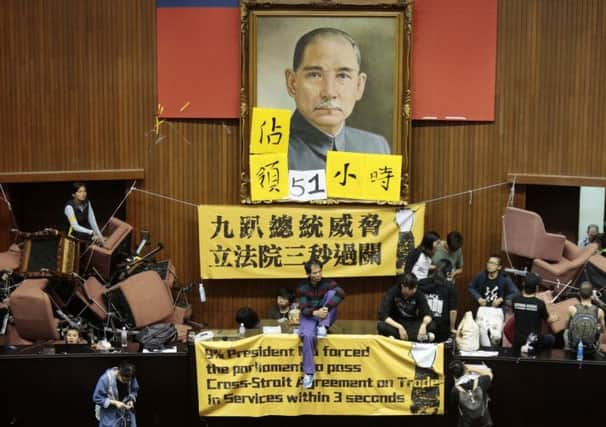Taiwan parliament occupied in China treaty protest


Around 200 protesters broke into the chamber in the capital, Taipei, at around 9pm local time on Tuesday.
They were calling for the ruling republican government of president Ma Ying-jeou to reverse its decision not to review the terms, clause by clause, of a trade treaty signed last year, before its ratification by parliament.
Advertisement
Hide AdAdvertisement
Hide AdAfter midnight on Tuesday, police tried but failed to clear the chamber as demonstrators used dozens of chairs to erect barricades around entrances. Several police were reportedly injured during brief clashes with the occupiers.
If passed, the trade deal would allow Taiwanese and Chinese service companies – in businesses ranging from insurance to hairdressing – to set up branches in each other’s territory.
China would allow Taiwanese companies to conduct online shopping and offer medical care, transport, tourism and other services on the mainland, while Taiwan would allow mainland companies to run businesses such as publishing, theatres, undertakers and medical care on the island. Opponents say the deal would cost Taiwan tens of thousands of jobs because small businesses on the island will be unable to compete with cash-rich, mostly state-run Chinese companies intent on investing in Taiwan.
They also say it would give a big boost to China’s efforts to reintegrate the island, which split from the mainland 65 years ago after the republican Kuomingtang (KMT) fled the Chinese mainland when Mao Zedong’s Communist forces gained the upper hand in the civil war.
During his six years in office, Mr Ma has pushed for greater integration of the two economies. In recent years, there has been a dramatic increase in passenger flights across the 100 mile-wide Taiwan Strait and in 2010 the two countries implemented a partial free trade agreement that slashed tariffs on an array of goods. Mr Ma’s KMT controls 65 seats in the 113-seat parliament so the bill’s final passage seems a foregone conclusion. But ratification has been held up by delaying tactics by the opposition Democratic Progressive Party and Mr Ma’s continuing row with the parliament’s speaker, a member of his own party.
A move this week by a KMT MP to transfer action on the pact from a parliamentary committee to a binding vote in the full chamber – without the promised review – appears to have galvanised opponents
After Tuesday night’s takeover of the chamber in Taipei, about 700 more protesters gathered outside the building, which was blocked off by dozens of police officers carrying riot shields.
Briefly joining the protesters inside yesterday were senior leaders of the Democratic Progressive Party, which in recent years has muted its traditional stance in favour of formal Taiwanese independence, amid efforts to increase support among middle-of-the-road voters.
Advertisement
Hide AdAdvertisement
Hide AdChen Wei-rong, a 30-year-old student at National Cheng Kung University in the southern city of Tainan, drove to Taipei yesterday after reading about the parliamentary occupation on Facebook. “I came here because this is a very important bill, and the government is not listening to the voice of the people,” he said.